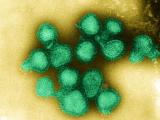Aug 18, 2005 (CIDRAP News) Nursing homes that serve Medicare and Medicaid recipients would have to vaccinate residents against influenza and pneumococcal disease to stay in the federal programs, under a plan announced last week.
Nursing homes would have to give the immunizations unless the patient or patient's family refused or the shots were medically contraindicated, the Center for Medicare and Medicaid Services (CMS) said in a news release.
The proposal was to be published Aug 15 in the Federal Register. Because of the approaching flu season, CMS set a comment period of only 15 days.
"Vaccines against these diseases are effective in preventing hospitalizations and death," CMS Administrator Mark B. McClellan, MD, PhD, said in the news release. "However, many people are not getting the vaccines they need. This initiative will be critical to maintaining high-quality care in the nation's long-term care facilities."
About 2 million Americans live in nursing homes, and people aged 65 and older account for more than 90% of flu-related deaths in the United States, the CMS said. The Centers for Disease Control and Prevention (CDC) estimates that 36,000 people die and 200,000 are hospitalized because of flu and its complications each year.
CMS also wants nursing home workers to get flu shots, but will not require that. The agency said research from the last flu season showed that only 36% of all healthcare workers received flu shots, even though immunizing nursing home employees has been shown to reduce death rates among residents of the homes.
Medicare officials hope to raise immunization coverage among nursing home residents for both flu and pneumococcal disease to 90%. A national nursing home survey in 1999 revealed that only 65% of residents had received flu shots and 38% had had a vaccination for bacterial pneumonia, the agency said.
To improve the incentive for vaccination, CMS in January increased the average Medicare payment for administering each shot from $8 to $18, in addition to a separate payment for the cost of the vaccine, officials said.
In case of a vaccine shortage, state agencies would have the option not to cite nursing homes for failing to comply with the immunization rules, according to the plan.
In developing its proposal, CMS received advice from the CDC and two large nursing home industry groups, the American Association of Homes and Services for the Aging and the American Health Care Association.



















